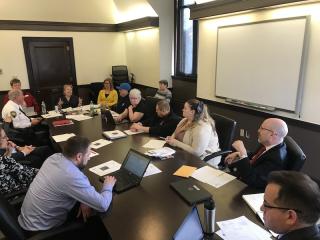COVID-19 Update

As the new virus known as COVID-19 continues to spread widely, the City of Melrose is making preparations to deal with a variety of possible future scenarios.
With the situation changing rapidly, Mayor Paul Brodeur emphasized that the only truly reliable sources for scientific information about the disease are the Centers for Disease Control and Prevention and the World Health Organization.
“Right now there is a lot of inaccurate information circulating on social media,” Brodeur said. “The CDC and the WHO have experts on staff who understand not only the science of this virus but also how best to contain it within communities such as ours, and we will be relying on them as well as our Health Department’s years of experience in dealing with this disease.”
Currently there are only a handful of cases in New England, but the disease is expected to spread. Many people who get it may only experience mild symptoms, or even none at all, but it is much more serious for people who have other medical conditions as well as those over 70.
Prevention
One thing the experts agree on is that sanitary precautions can help slow the spread of the disease:
- Wash your hands frequently with soap and warm water
- If soap and water aren’t available, use an alcohol-based hand sanitizer with at least 60% alcohol
- Avoid touching your eyes, nose, and mouth.
- Wipe down doorknobs and other hard surfaces frequently, using a regular household cleaning spray or wipe.
- Avoid close contact with people who are sick.
- Stay home when you are sick.
- Cover your cough or sneeze with a tissue, then throw the tissue in the trash.
Masks are only recommended for people who are ill, in order to stop them from spreading their illness to others.
If You Think You Are Ill
First of all, keep in mind that this is the season for colds and flu. Every illness is not COVID-19. If you feel ill, call your doctor’s office. They will advise you as to what to do. Stay home and avoid contact with other people as much as possible. Don’t go to work, to school, or to other public areas.
If you believe you have been exposed to COVID-19, call your doctor. Do not simply show up in your doctor’s office or the hospital. Your doctor can coordinate testing with the state Health Department.
Preparation
Health Director Ruth Clay is in charge of the City of Melrose’s COVID-19 response. She is in regular communication with the Massachusetts Department of Public Health and the CDC, as well as with the Melrose School Department and MelroseWakefield Health Care. Specific guidelines have been distributed to the Melrose Police and Fire Departments regarding the additional precautions they should take. MelroseWakefield Hospital is also prepared for a possible outbreak, using protocols and lessons learned from their experience with the H1N1 virus and updating them for the current situation.
Superintendent of Schools Cyndy Taymore is responsible for the Melrose Public Schools’ response, and she is working in close consultation with Clay.
If the disease spreads widely, as it has in other countries, it is possible that residents will be asked to prepare for “social distancing,” which basically means staying at home and avoiding public places. This would be important in order to minimize the spread of the disease. People who have even a mild case of COVID-19 will be asked to stay home and “self-isolate,” and others may want to avoid large gatherings in order to keep from catching or inadvertently spreading the virus.
What this means for Melrose residents is that everyone should prepare now for the possibility that they may need to stay home, or avoid contact with other people, for 14 to 27 days. This is a good time to plan for possible school closures and to stock up on food, medication, and cleaning supplies.
“The CDC’s recommendations are actually pretty standard for any sort of an emergency, such as a snowstorm or hurricane,” said Brodeur. “This is a good reminder to check your cupboards and freezer, toss outdated food, and stock up on basic supplies such as nonperishable foods, pet food, toilet paper, and medications. This will allow you to avoid crowded stores should the virus spread widely throughout the community.”
The City of Melrose is reviewing its Continuity of Government plans for allowing city operations to continue even if some employees cannot report to work, or if City Hall is closed.
